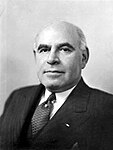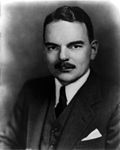The 1938 New York state election was held on November 8, 1938, to elect the governor, the lieutenant governor, the state comptroller, the attorney general, two U.S. Senators and two U.S. Representatives-at-large, as well as all members of the New York State Assembly and the New York State Senate. The 1938 election was the first election where the Governor of New York was elected to a four-year term, rather than a two-year term.
| ||||||||||||||||||||
| ||||||||||||||||||||
 County results Lehman: 50-60% 60-70% 70-80% | ||||||||||||||||||||
| ||||||||||||||||||||
History
editThe Republican state convention met on September 29, Speaker Oswald D. Heck presided. They nominated D.A. of New York Thomas E. Dewey for governor. Also nominated were Frederic H. Bontecou for lieutenant governor; Julius Rothstein for comptroller; Col. Arthur V. McDermott for attorney general; and John Lord O'Brian and Edward Corsi for the U.S. Senate.[1]
The Democratic state convention met on October 1, and re-nominated the incumbents Lehman, Tremaine, Bennett and Wagner; and completed the ticket with Supreme Court Justice Charles Poletti for lieutenant governor; and John M. Mead for short term in the U.S. Senate.[2]
The Socialist state convention met on October 1, and nominated again Norman Thomas for governor; and Dr. George W. Hartmann for lieutenant governor; Coleman B. Cheney for Comptroller; and Miss Marion L. Severn for attorney general.[3]
The American Labor state convention met on October 3 at the Manhattan Opera House in New York City and nominated the Democratic incumbent Herbert H. Lehman for governor. They also endorsed Democrats Poletti, Wagner, Mead,[4] Merritt and O'Day; and completed the ticket with Langdon W. Post for Comptroller and Joseph V. O'Leary for Attorney-General.[5] Lehman was only able to win reelection due to the votes he received on the American Labor ballot line. Dewey received more votes on the Republican ballot line than Lehman had on the Democratic ballot line.[6]
The "Independent Progressive" Party filed a petition to nominate a ticket headed by Republican Thomas E. Dewey. This was done to have a second ballot line, like Gov. Lehman who ran on two lines also.[7]
The Socialist Labor Party changed its name and filed a petition to nominate candidates as the "Industrial Government Party."[8]
Result
editThe whole Democratic ticket was elected.
The incumbents Lehman, Tremaine, Bennett, Wagner, Merritt and O'Day were re-elected. This was the first election where governors were elected to four year terms.
| Office | Democratic ticket | Republican ticket | American Labor ticket | Communist ticket | Socialist ticket | Independent Progressive ticket | Industrial Government ticket | |||||||
|---|---|---|---|---|---|---|---|---|---|---|---|---|---|---|
| Governor | Herbert H. Lehman | 1,971,307 | Thomas E. Dewey | 2,302,505 | Herbert H. Lehman | 419,979 | (none) | Norman Thomas | 24,980 | Thomas E. Dewey | 24,387 | Aaron M. Orange | 3,516 | |
| Lieutenant Governor | Charles Poletti | 1,976,166 | Frederic H. Bontecou | 2,130,088 | Charles Poletti | 395,313 | George W. Hartmann[a] | 29,282 | Frederic H. Bontecou | 12,030 | Jacob Berlin | 4,012 | ||
| Comptroller | Morris S. Tremaine | 2,220.931 | Julius Rothstein | 1,829,006 | Langdon W. Post[b] | 413,234 | Langdon W. Post | 25,910 | Julius Rothstein | 10,703 | Jacob Grossman | 4,323 | ||
| Attorney General | John J. Bennett Jr. | 2,151,831 | Arthur V. McDermott[c] | 1,950,187 | Joseph V. O'Leary | 391,901 | Joseph O'Leary | 23,963 | Arthur V. McDermott | 11,044 | Frank Passonno | 8.756 | ||
| U.S. Senator (full term) | Robert F. Wagner | 2,098,919 | John Lord O'Brian | 2,046,794 | Robert F. Wagner | 398,410 | Herman J. Hahn[d] | 23,553 | John Lord O'Brian | 11,821 | O. Martin Olson[e] | 3,851 | ||
| U.S. Senator (short term)[f] | James M. Mead | 2,060,876 | Edward F. Corsi | 2,083,666 | James M. Mead | 378,028 | Harry W. Laidler | 27,161 | ||||||
| U.S. Representative-at-large | Matthew J. Merritt | 2,023,131 | Richard B. Scandrett Jr. | 1,980,352 | Matthew J. Merritt | 329,029 | Israel Amter | 105,681 | Brendan Sexton | 24,990 | Richard B. Scandrett | 10,103 | Jeremiah D. Crowley[g] | 5,080 |
| U.S. Representative-at-large | Caroline O'Day | 2,024,135 | Helen Z. M. Rodgers | 2,000,814 | Caroline O'Day | 339,328 | Edna Mitchell Blue[h] | 25,214 | Helen Z.M. Rogers | 10,753 | William Herlet | 4,291 | ||
Obs.:
- "Blank, void and scattering" votes: 75,047 (Governor)
- The vote for governor is used to define ballot access, for all other offices numbers are totals on all tickets for candidates nominated on more than one.
Notes
edit- ^ Dr. George Wilfried Hartmann (1904-1955), psychologist, of Columbia University, editor of The Social Frontier, ran also for Mayor of New York in 1941
- ^ Langdon W. Post (1899-1981), Harvard graduate, Dem. assemblyman 1929-32, Chairman of the New York City Housing Authority under Mayor La Guardia, "LANGDON W. POST, 82, DEAD; HOUSING AND LABOR ADVISOR", The New York Times, September 5, 1981 (subscription required)
- ^ Col. Arthur V. McDermott, of Brooklyn, lawyer, during World War II New York City Director of the Selective Service Administration
- ^ Rev. Herman J. Hahn, of Buffalo, ran also for Lieutenant Governor in 1928 and 1936
- ^ O. Martin Olson, of Jamestown, ran also for Comptroller in 1934
- ^ to fill the vacancy caused by the death of Royal S. Copeland
- ^ Jeremiah D. Crowley, of Marcellus, ran also for State Engineer in 1910; for Lieutenant Governor in 1912, 1914 and 1920; for Governor in 1916, 1922, 1926 and 1930; for the U.S. Senate in 1932; and for Congress at-large in 1934
- ^ Edna Mitchell Blue, wife of Lewi Tonks, ran also in 1938
References
edit- ^ "DEWEY NOMINATED BY REPUBLICANS", The New York Times, September 30, 1938 (subscription required)
- ^ "LEHMAN IS DRAFTED FOR FOURTH TERM", The New York Times, October 1, 1938 (subscription required)
- ^ "SOCIALISTS ASSAIL 'DEALS' BY LABOR; ...THOMAS IS NOMINATED", The New York Times, October 2, 1938 (subscription required)
- ^ "LABORITES NAME LEHMAN, WAGNER", The New York Times, October 4, 1938 (subscription required)
- ^ "LABOR NAMES MEAD AS SESSIONS CLOSE; Convention Also Nominates Post, O'Leary, Mrs. O'Day and Merritt to Fill Ticket", The New York Times, October 5, 1938 (subscription required)
- ^ Murphy, Paul (1974). Political Parties In American History, Volume 3, 1890-present. G. P. Putnam's Sons.
- ^ "MAJOR PARTIES GET 2D LINES ON BALLOT", The New York Times, October 12, 1938 (subscription required)
- ^ "INDUSTRIAL PARTY LISTS CANDIDATES", The New York Times, November 6, 1938 (subscription required)
Sources
edit- Official Result: "LEHMAN PLURALITY OFFICIALLY 64,394; State Board Puts His Vote Finally at 2,391,286, With 2,326,892 for Dewey LABOR'S POLL AT 419,979 Blank, Void and Scattered Ballots Totaled 75,047; Poletti Won by 229,361", The New York Times, December 8, 1938 (subscription required)
New York Red Book

